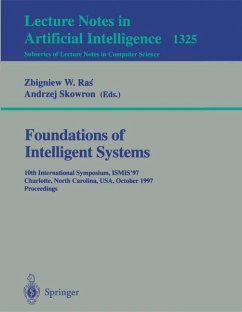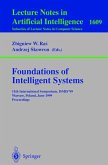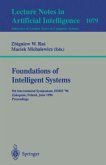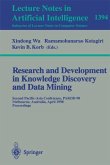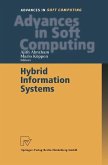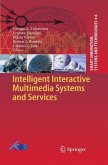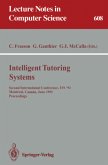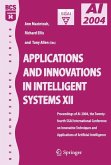Ras10th International Symposium, ISMIS '97. Charlotte, North Carolina, USA, October 15-18, 1997. Proceedings
Foundations of Intelligent Systems
10th International Symposium, ISMIS '97. Charlotte, North Carolina, USA, October 15-18, 1997. Proceedings
Herausgegeben:Ras, Zbigniew W.
Ras10th International Symposium, ISMIS '97. Charlotte, North Carolina, USA, October 15-18, 1997. Proceedings
Foundations of Intelligent Systems
10th International Symposium, ISMIS '97. Charlotte, North Carolina, USA, October 15-18, 1997. Proceedings
Herausgegeben:Ras, Zbigniew W.
- Broschiertes Buch
- Merkliste
- Auf die Merkliste
- Bewerten Bewerten
- Teilen
- Produkt teilen
- Produkterinnerung
- Produkterinnerung
This book constitutes the refereed proceedings of the 10th International Symposium on Methodologies for Intelligent Systems, ISMIS'97, held in Charlotte, NC, USA, in October 1997. The 57 revised full papers were selected from a total of 117 submissions. Also included are four invited papers. Among the topics covered are intelligent information systems, approximate reasoning, evolutionary computation, knowledge representation and integration, learning and knowledge discovery, AI-Logics, discovery systems, data mining, query processing, etc.
Andere Kunden interessierten sich auch für
![Foundations of Intelligent Systems Foundations of Intelligent Systems]() Zbigniew W. Ras / Andrzej Skowron (eds.)Foundations of Intelligent Systems77,99 €
Zbigniew W. Ras / Andrzej Skowron (eds.)Foundations of Intelligent Systems77,99 €![Foundations of Intelligent Systems Foundations of Intelligent Systems]() RasFoundations of Intelligent Systems77,99 €
RasFoundations of Intelligent Systems77,99 €![Research and Development in Knowledge Discovery and Data Mining Research and Development in Knowledge Discovery and Data Mining]() WuResearch and Development in Knowledge Discovery and Data Mining39,99 €
WuResearch and Development in Knowledge Discovery and Data Mining39,99 €![Hybrid Information Systems Hybrid Information Systems]() Ajith Abraham / Mario Köppen (eds.)Hybrid Information Systems77,99 €
Ajith Abraham / Mario Köppen (eds.)Hybrid Information Systems77,99 €![Intelligent Interactive Multimedia Systems and Services Intelligent Interactive Multimedia Systems and Services]() Intelligent Interactive Multimedia Systems and Services115,99 €
Intelligent Interactive Multimedia Systems and Services115,99 €![Intelligent Tutoring Systems Intelligent Tutoring Systems]() FrassonIntelligent Tutoring Systems77,99 €
FrassonIntelligent Tutoring Systems77,99 €![Applications and Innovations in Intelligent Systems XII Applications and Innovations in Intelligent Systems XII]() Ann Macintosh / Richard Ellis / Tony Allen (eds.)Applications and Innovations in Intelligent Systems XII115,99 €
Ann Macintosh / Richard Ellis / Tony Allen (eds.)Applications and Innovations in Intelligent Systems XII115,99 €-
-
-
This book constitutes the refereed proceedings of the 10th International Symposium on Methodologies for Intelligent Systems, ISMIS'97, held in Charlotte, NC, USA, in October 1997. The 57 revised full papers were selected from a total of 117 submissions. Also included are four invited papers. Among the topics covered are intelligent information systems, approximate reasoning, evolutionary computation, knowledge representation and integration, learning and knowledge discovery, AI-Logics, discovery systems, data mining, query processing, etc.
Hinweis: Dieser Artikel kann nur an eine deutsche Lieferadresse ausgeliefert werden.
Hinweis: Dieser Artikel kann nur an eine deutsche Lieferadresse ausgeliefert werden.
Produktdetails
- Produktdetails
- Lecture Notes in Computer Science 1325
- Verlag: Springer / Springer Berlin Heidelberg / Springer, Berlin
- Artikelnr. des Verlages: 10545727, 978-3-540-63614-4
- 1997.
- Seitenzahl: 648
- Erscheinungstermin: 29. September 1997
- Englisch
- Abmessung: 235mm x 155mm x 35mm
- Gewicht: 878g
- ISBN-13: 9783540636144
- ISBN-10: 3540636145
- Artikelnr.: 09244826
- Herstellerkennzeichnung
- Springer-Verlag GmbH
- Tiergartenstr. 17
- 69121 Heidelberg
- ProductSafety@springernature.com
- Lecture Notes in Computer Science 1325
- Verlag: Springer / Springer Berlin Heidelberg / Springer, Berlin
- Artikelnr. des Verlages: 10545727, 978-3-540-63614-4
- 1997.
- Seitenzahl: 648
- Erscheinungstermin: 29. September 1997
- Englisch
- Abmessung: 235mm x 155mm x 35mm
- Gewicht: 878g
- ISBN-13: 9783540636144
- ISBN-10: 3540636145
- Artikelnr.: 09244826
- Herstellerkennzeichnung
- Springer-Verlag GmbH
- Tiergartenstr. 17
- 69121 Heidelberg
- ProductSafety@springernature.com
Goal-oriented multimedia dialogue with variable initiative.- Knowledge-based image retrieval with spatial and temporal constructs (Invited paper).- Verification and validation of AI systems that control deep-space spacecraft.- Data mining and knowledge discovery: The third generation.- Embedding prioritized circumscription in logic programs.- Extending temporal logic for capturing evolving behaviour.- A description logic model for querying knowledge bases for structured documents.- Refining first order theories with neural networks.- A way of increasing both autonomy and versatility of a KDD system.- A comparison of atttribute selection strategies for attribute-oriented generalization.- Boolean reasoning for feature extraction problems.- World model construction in children during physics learning.- Document explorer: Discovering knowledge in document collections.- Well-behaved evaluation functions for numerical attributes.- An improved inductive learning algorithm with a preanalysis of data.- Efficient induction of numerical constraints.- Learning English syllabification for words.- Towards conceptual query answering.- An implementation platform for query-answering in default logics: Theoretical underpinnings.- Automating spoken dialogue systems.- Handwritten digit recognition by local principal components analysis.- From conceptual model to internal model.- Speeding GA-based attribute selection for image interpretation.- Using recurrent selection to improve GA performance.- A coevolutionary approach to concept learning.- Representation of music in a learning classifier system.- On multi-class problems and discretization in inductive logic programming.- Discovering empirical equations from robot-collected data.- Induction of positive and negative deterministic rules based on rough set model.- Autonomous database mining and disorder measures.- KOMET - A system for the integration of heterogeneous information sources.- Towards AI formalisms for legal evidence.- Type extensibility of a knowledge representation system with powersets.- Planning based on view updating in deductive databases.- Generic and fully automatic content based image retrieval architecture.- Program synthesis from examples by theory formation.- Interval approaches for uncertain reasoning.- Qualitative versus quantitative interpretation of the mathematical theory of evidence.- Knowledge discovery from databases with the guidance of a causal network.- From data to knowledge: method-specific transformations.- Generalized rules in incomplete information systems.- An interactive constraint-based system for selective attention in visual search.- Abstraction of representation for interoperation.- TraumaCASE: Exploiting the knowledge base of an existing decision support system to automatically construct medical cases.- An intelligent system dealing with negative information.- On representation-based querying of databases containing ill-known values.- Decision value oriented decomposition of data tables.- A machine learning experiment to determine part of speech from word-endings.- Learning flexible concepts from uncertain data.- Determining attribute relevance in decision trees.- A WordNet based rule generalization engine in meaning extraction system.- Representing and reasoning on SGML documents.- Conceptual modelling of the "meaning" of textual narrative documents.- Intelligent computation of presentation documents.- Flexible database querying based on associations of domain values.- A modal logical framework for security policies.- Completeness for linear regularnegation normal form inference systems.- Renaming a set of non-horn clauses.- Constraints, causal rules and minimal change in model-based update.- Knowledge revision for document understanding.
Goal-oriented multimedia dialogue with variable initiative.- Knowledge-based image retrieval with spatial and temporal constructs (Invited paper).- Verification and validation of AI systems that control deep-space spacecraft.- Data mining and knowledge discovery: The third generation.- Embedding prioritized circumscription in logic programs.- Extending temporal logic for capturing evolving behaviour.- A description logic model for querying knowledge bases for structured documents.- Refining first order theories with neural networks.- A way of increasing both autonomy and versatility of a KDD system.- A comparison of atttribute selection strategies for attribute-oriented generalization.- Boolean reasoning for feature extraction problems.- World model construction in children during physics learning.- Document explorer: Discovering knowledge in document collections.- Well-behaved evaluation functions for numerical attributes.- An improved inductive learning algorithm with a preanalysis of data.- Efficient induction of numerical constraints.- Learning English syllabification for words.- Towards conceptual query answering.- An implementation platform for query-answering in default logics: Theoretical underpinnings.- Automating spoken dialogue systems.- Handwritten digit recognition by local principal components analysis.- From conceptual model to internal model.- Speeding GA-based attribute selection for image interpretation.- Using recurrent selection to improve GA performance.- A coevolutionary approach to concept learning.- Representation of music in a learning classifier system.- On multi-class problems and discretization in inductive logic programming.- Discovering empirical equations from robot-collected data.- Induction of positive and negative deterministic rules based on rough set model.- Autonomous database mining and disorder measures.- KOMET - A system for the integration of heterogeneous information sources.- Towards AI formalisms for legal evidence.- Type extensibility of a knowledge representation system with powersets.- Planning based on view updating in deductive databases.- Generic and fully automatic content based image retrieval architecture.- Program synthesis from examples by theory formation.- Interval approaches for uncertain reasoning.- Qualitative versus quantitative interpretation of the mathematical theory of evidence.- Knowledge discovery from databases with the guidance of a causal network.- From data to knowledge: method-specific transformations.- Generalized rules in incomplete information systems.- An interactive constraint-based system for selective attention in visual search.- Abstraction of representation for interoperation.- TraumaCASE: Exploiting the knowledge base of an existing decision support system to automatically construct medical cases.- An intelligent system dealing with negative information.- On representation-based querying of databases containing ill-known values.- Decision value oriented decomposition of data tables.- A machine learning experiment to determine part of speech from word-endings.- Learning flexible concepts from uncertain data.- Determining attribute relevance in decision trees.- A WordNet based rule generalization engine in meaning extraction system.- Representing and reasoning on SGML documents.- Conceptual modelling of the "meaning" of textual narrative documents.- Intelligent computation of presentation documents.- Flexible database querying based on associations of domain values.- A modal logical framework for security policies.- Completeness for linear regularnegation normal form inference systems.- Renaming a set of non-horn clauses.- Constraints, causal rules and minimal change in model-based update.- Knowledge revision for document understanding.

